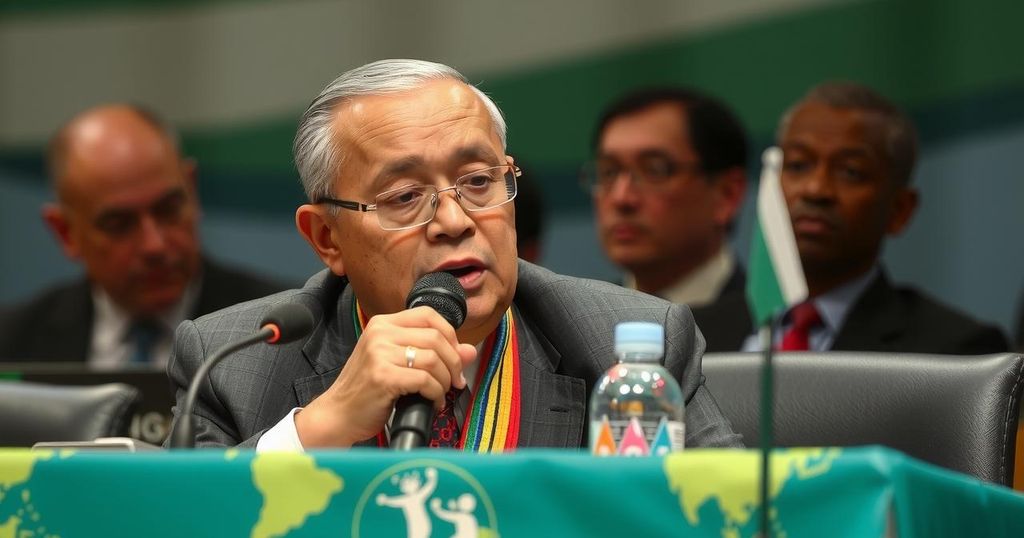Climate change
AFRICA, ANTÓNIO GUTERRES, ANTONIO GUTERRES, CLIMATE CHANGE, FOOD SECURITY, GUT, GUTERRES, GUTTERES, INTERNATIONAL COOPERATION, KATSE DAM, LESOTHO, NATIONS, PARIS AGREEMENT, SOUTH AFRICA, SOUTHERN AFRICA, U. N. SECURITY COUNCIL, UN, UNITED NATIONS, WORLD METEOROLOGICAL ORGANIZATION
Jamal Walker
0 Comments
Guterres Urges Wealthy Nations to Deliver on Climate Finance Commitments in Lesotho
UN Secretary-General Antonio Guterres urged wealthy countries to fulfill their climate finance commitments to assist poorer nations like Lesotho in fighting climate change, emphasizing the urgency of support amid ongoing droughts and food crises affecting millions. He also advocated for Africa’s representation in the U.N. Security Council, calling for justice in global decision-making.
United Nations Secretary-General Antonio Guterres has called upon affluent nations to fulfill their climate finance commitments to assist poorer countries in combating the effects of climate change during his speech to the Parliament of Lesotho. Guterres emphasized the urgent need for financial support, particularly for landlocked and least developed nations that face severe vulnerabilities due to the impacts of global warming.
His visit to Lesotho, part of a three-day tour of southern Africa that also included South Africa, highlighted the necessity of addressing climate-induced disasters, especially as the continent struggles with ongoing drought conditions. In the previous month, countries agreed at a U.N. climate summit in Azerbaijan to mobilize at least $300 billion annually; however, this figure falls significantly short of the more than $1 trillion demanded by developing nations. Guterres stated, “Developed countries must meet their commitments … and deliver the promised $300 billion annually for climate finance.”
Additionally, Guterres remarked on the importance of making the newly established Loss and Damage Fund operational, advocating for substantial funding from the major contributors to climate degradation. Presently, Southern Africa is experiencing one of its most devastating droughts, exacerbating food insecurity for over 27 million individuals. Lesotho, in particular, has declared a national disaster in reaction to the significant impact on agricultural production.
Further discussions emphasized the long-standing demand for Africa to gain permanent representation within the U.N. Security Council, a proposal Guterres believes is justifiable given the continent’s considerable population and socio-political dynamics. He stated, “When a continent that is home to nearly a fifth of humanity remains systematically excluded from global decision-making, we must call this what it is, a relic of colonialism that has no place in today’s world.”
Guterres is scheduled to visit the Katse Dam, part of a critical water management project that seeks to alleviate water scarcity in South Africa while also optimizing Lesotho’s water resources. His advocacy for both climate finance and equitable representation underscores the intersection of resource management, environmental justice, and global governance challenges that characterize current international relations.
The topic of climate finance is increasingly pressing as developing nations, particularly in Africa, grapple with the severe consequences of climate change despite contributing relatively little to global greenhouse emissions. The recent global climate discussions have pointed to the need for wealthy countries to provide financial resources to assist poorer nations in adapting and mitigating climate impacts. The establishment of financial frameworks, such as the Loss and Damage Fund, aims to provide compensation for nations that suffer due to climate-related disasters, underscoring the necessity of accountability from developed nations regarding their contributions to climate degradation.
In summary, Secretary-General Guterres’ visit to Lesotho illustrates the critical need for rich nations to adhere to their climate finance commitments, particularly for vulnerable countries such as Lesotho facing severe challenges from climate change. His remarks on Africa’s lack of representation in the U.N. Security Council further highlight the need for structural changes in global governance to ensure equitable decision-making. The integration of environmental finance and enhanced representation will be essential for fostering a just and sustainable future for all nations, especially those on the front lines of climate disasters.
Original Source: www.independent.co.uk




Post Comment